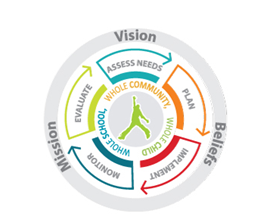Continuous Improvement Process
The Michigan Integrated Continuous Improvement Process (MICIP) (formerly School Improvement) is a whole-child, district needs assessment, leading to an integrated and streamlined continuous improvement planning process. This helps ensure all Michigan districts think comprehensively about the entire range of student needs, develop high-quality plans, and use their funding effectively to implement those plans and meet those needs.

Whole Child Resources
Whole Child Tenets
Each student enters school healthy and learns about and practices a healthy lifestyle.
Each student learns in an environment that is physically and emotionally safe for students and adults.
Each student is actively engaged in learning and is connected to the school and broader community.
Each student has access to personalized learning and is supported by qualified, caring adults.
Each student is challenged academically and prepared for success in college or further study and for employment and participation in a global environment.
Resources
Evidence-Based Interventions
What Works Clearinghouse: A central source of scientific evidence for what works in education. (Institute of Education Sciences)
Standards Alignment
EdReports.org: Provides reports that help evaluate educational materials. High quality content matters to teachers, to kids, and to our collective future.
Selection and Alignment Tools
Our School Data (Local Data Warehouse)
Helping educators to analyze data to improve instruction and measure progress toward student achievement goals. The data warehouse contains all Michigan State assessments and data for over eighty districts across seven ISDs/RESAs.
Kent ISD has developed a data warehouse for the purpose of improving student achievement.
Data warehousing is a valuable, proven approach to providing educators at all levels of an organization with the information needed to make high impact decisions. Kent ISD has built and is operating a data warehouse that contains data from student management systems, Michigan assessment systems such as M-STEP, MME, WIDA and MI-Access, business data systems and others. Users access our secure portal via the internet to run reports and queries.
Data warehousing breaks data barriers and consolidates information from various systems. Over eighty districts across seven counties are now utilizing the data warehouse to analyze data to improve classroom instruction, measure progress toward school improvement goals and assist with reporting requirements.
Partner ISDs/RESAs include:
- Ionia ISD
- Kent ISD
- Muskegon ISD
- Montcalm ISD
- Newaygo County RESA
- Ottawa ISD
Support all State Assessments (M-STEP, MME, WIDA, MI-Access):
-
Approximately 20 additional data sets including: College Board (PSAT,SAT), MAP, SRI, STAR, iReady, WorkKeys, SWIS, SRSS, Local District Assesssment; with more in development
-
Cross Platform Support (Mac and PC)
Approximately 290 available reports:
- Classroom, School and District level reporting
- Reports designed in partnership with local administrators and teachers
- Reports designed to support Accountability requirements (SDA, Annual Ed Report)
- Reports developed in-house by ISD staff based on local district ideas and needs
- Experience working with multiple Student Management Systems: PowerSchool, Skyward, Infinite Campus, and Synergy.
Access OurSchoolData
MI School Data (Michigan's Education Data Portal)
MISchool Data is a statewide PK-20 educational portal of school performance in Michigan. There are two sides to MISchool Data, a public facing portal and an educator password protected portal.
Useful Data:
MISchool Data provides at-a-glance dashboards and reports on student testing, graduation and dropout rates, K-12 and college enrollments, staffing, finance, facilities data, and more.
Something for Everyone:
Parents, educators, policy makers- MISchool Data has valuable information for every citizen.
Access MISchool Data
Request a Password
An account will be created shortly after the submission of your contact information and a FERPA quiz. Access the online quiz now. If you should experience any difficulties, please contact Mark Maynard.
Continuous Improvement Team
Laura Otten
(616)365-2286
Beth Peterson
(616)365-2285
Stephanie Villalta
(616)301-8845
Laura Emshanov
(616)365-2426





